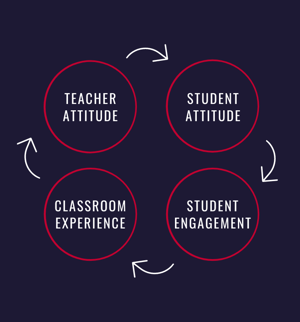We want to say thank you to all of the current and aspiring teachers out there, without you none of us would be where we are today. You have done this job without nearly enough recognition and you have inspired a love of learning in more people that you will ever know.
Happy Future Teachers of America Day!

Our teachers consistently work hard to be the best they can be, but unfortunately their efforts don't always result in an enhanced student experience. Given that the American Dream is centered around the idea of hard work, it can be easy to assume that the teachers just aren't doing enough because they are lazy.
"Consider the radical proposition that there is no such thing as laziness. What we call laziness is simply people’s very legitimate objection to being shamed into doing what they don’t want to do. People vote with their feet; they do exactly what they want to do, and don’t do what they don’t want to do." - Avrum Weiss, Ph.D.
A parent may look at this and decide that their child's teacher may not be lazy but they are choosing not to be a better teacher because deep down they don't care and don't want to try.
In reality, almost all teachers are neither lazy nor apathetic. Most employees have trouble finding their role early on in their career due to an onboarding process that doesn't set clear goals and expectations. Some companies do a performance review or check in a few times within the first year of employment and then move to an annual performance review. The problem that employees have with this is they're not entirely sure what the expectations are at the beginning and they get feedback infrequently and not immediately after the events that may have affected their performance review. Teachers have it even harder now because many who have never taught a course online in their careers are being forced to learn how to be effective and keep their students engaged.
Teaching is more challenging than many other jobs because even their supervisors are going to have trouble rating their performance because the supervisors aren't working with them in the classroom. The only people who really know how the teacher is performing and how they could improve is the group of students they are teaching.
When I was in high school I don't remember rating any of my teachers. In college we completed forms a week or two before the end of the semester, but we just assumed that no one read them - especially after I had a few professors twice and didn't see any positive changes. Students rarely put much effort into filling these forms out because they feel like their voices are not being heard and they are just checking a box for the university.
Here's the problem:
-
-
- Students don't take the the time to fill out the course evaluation surveys because they are either not given out or they feel like no one is going to read them
- Supervisors are not in the classroom so are unable to effectively evaluate teachers
- Teachers do not have the tools to improve because their performance evaluation metrics are not consistent or reliable
-
Most teachers want to do a good job, there are countless studies that prove that people enjoy improving and praise for their work. They just need the right management and resources to do so.
That's where our Learner Analytics Solution comes in.
We want to give teachers the ability to improve from the very beginning by giving them constant access to what their students are saying about them. We recommend that short surveys are given to the students regularly so the instructor can see important information like where students are getting confused, which teaching methods are helpful and which are not, if the teaching methods are engaging the students and making them feel like what they are learning is interesting, etc. 
More surveys usually means more time a teacher will have to sit down and read through them, but with all of the changes and adjustments going on they don't have time. With the power of artificial intelligence and natural language processing there is no need to, instructors can quickly view themes and drill down into direct quotes from the students when they need more specific information.
If teachers have access to this information in a clean and concise way, they can work to make changes as the course goes on to ensure the students are getting the best experience. They will be rewarded immediately upon seeing their feedback improve and become more positive, which will make them feel more engaged and connected to their students. This positive attitude will have a measurable effect on their students' engagement, desire to learn, and connection to the teacher. The result is a cycle of increased positivity, engagement, and connection.
Doing it this way will help new teachers improve faster and make changes that it may have otherwise taken years to figure out. We love our teachers and we love our children and we want the best for them. All it takes is giving them both the right tools to succeed.
Curious what the Learner Analytics Solution might look like?
If you want to see the entire dashboard Contact Us!
To learn more about how to avoid teacher turnover, Check Out this Blog Post by QAA!
A special thank you to Mrs. Creswell, Ms. Visconti, Mrs. Dill, and Mr. Tellers for being amazing teachers and inspiring me to work hard and keep learning! I didn't appreciate it enough at the time but all of my successes can be attributed to your hard work and care.



